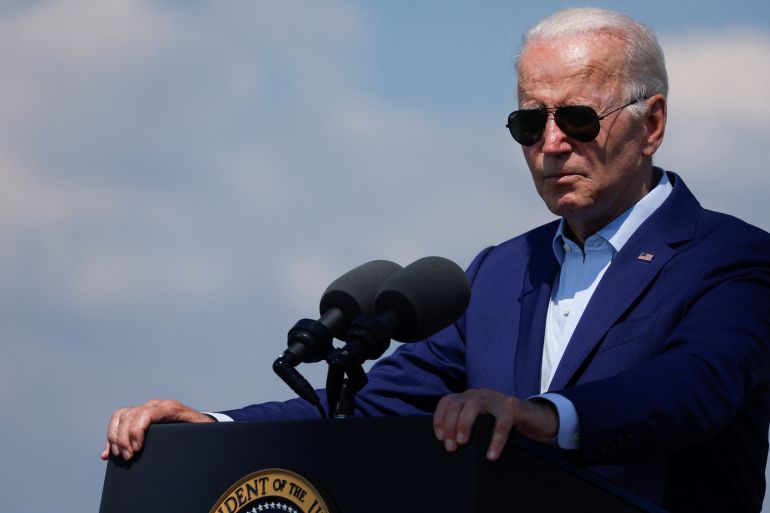Biden unveils steps on climate, but no ’emergency’ designation
The executive action is expected to include new initiatives to bolster the offshore wind industry in the United States.

United States President Joe Biden said climate change is a “clear and present danger” while announcing new executive action that addressed some concerns among his own Democratic Party on the issue, but stopped short of declaring a federal emergency.
Biden unveiled the latest efforts during a visit on Wednesday to a former coal-fired power plant in Somerset, Massachusetts, that is shifting to offshore wind manufacturing. It is the embodiment of the transition to clean energy that Biden is seeking but has struggled to realise in the first 18 months of his presidency.
Keep reading
list of 3 itemsPacific islands demand climate action as China, US woo region
China’s coal plant approvals up despite climate goals: Greenpeace
“Climate change is literally an existential threat to our nation and to the world,” Biden said in a speech.
“This is an emergency and I will look at it that way,” he said.
Biden said that in the coming days, his administration will announce more executive actions to combat climate change. Wednesday’s announcement includes new initiatives to bolster the domestic offshore wind industry, as well as efforts to help communities cope with soaring temperatures through programmes administered by the Federal Emergency Management Agency and the Department of Health and Human Services.
The move came as historic temperatures bake Europe and the United States. Some 100 million Americans will be under heat warnings this week as cities around the US sweat through more intense and longer-lasting heat waves that scientists have blamed on global warming.
Biden’s action, however, does not include a national emergency declaration to address the climate crisis — something that has been sought by activists and Democratic lawmakers after Senator Joe Manchin scuttled talks last week on a long-delayed legislative package.
An emergency declaration on climate would allow Biden to redirect federal resources to bolster renewable energy programmes that would help accelerate the transition away from fossil fuels. The declaration also could be used as a legal basis to block oil and gas drilling or other projects, although such actions would likely be challenged in court by energy companies or Republican-led states.
Biden promised tough action on climate change in his presidential campaign and pledged in international climate negotiations to cut climate pollution by 50 percent by 2030 and reach 100 percent clean electricity by 2035.
But that climate agenda has been derailed by several major setbacks, including Congress failing to pass crucial climate and clean energy measures in a federal budget bill, record-setting petrol prices, and Russia’s invasion of Ukraine disrupting global energy markets.
A Supreme Court ruling last month limiting the federal government’s authority to issue sweeping regulations to reduce carbon emissions from power plants also is undermining Biden’s climate plans.
White House officials have said the option to declare a federal emergency remains under consideration. Press secretary Karine Jean-Pierre on Tuesday declined to outline a timetable for a decision aside from saying no such order would be issued this week.

In a Factsheet, the White House on Wednesday said the executive action includes $2.3bn in federal funding for states to build cooling centres to protect communities from excessive heat and to take measures to tackle the other impacts of climate change, such as droughts, wildfires, floods and hurricanes.
The White House has indicated it still wants Congress to take action on climate, but that in the meantime, Biden will address the climate issue on his own.
“As President, I will use my executive powers to combat the climate crisis in the absence of Congressional action,” Biden said during his remarks.
Biden on Wednesday will be visiting the former Brayton Point power plant, which closed in 2017 after burning coal for more than five decades. The plant will now become an offshore wind manufacturing site.
A new report said the US and other major carbon-polluting nations are falling short on pledges to fight climate change. Among the 10 biggest carbon emitters, only the European Union has enacted policies close to or consistent with international goals of limiting warming to just a few more tenths of a degree, according to scientists and experts who track climate action in countries.